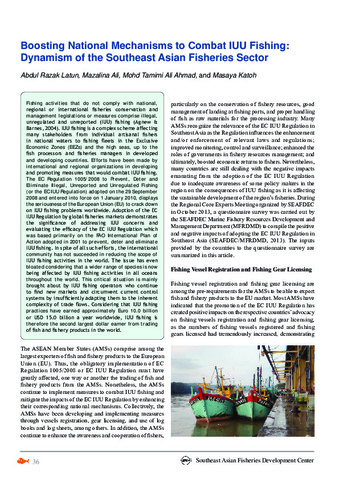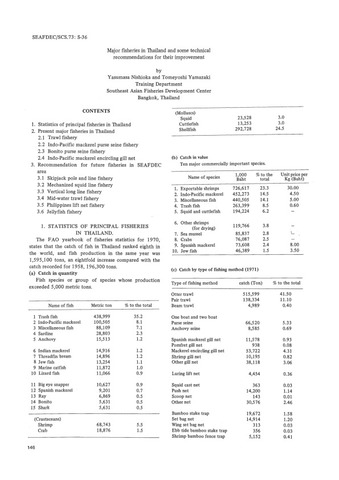Boosting national mechanisms to combat IUU fishing: Dynamism of the Southeast Asian fisheries sector
Share
Abstract
Fishing activities that do not comply with national, regional or international fisheries conservation and management legislations or measures comprise illegal, unregulated and unreported (IUU) fishing (Agnew & Barnes, 2004). IUU fishing is a complex scheme affecting many stakeholders from individual artisanal fishers in national waters to fishing fleets in the Exclusive Economic Zones (EEZs) and the high seas, up to the fish processors and fisheries managers in developed and developing countries. Efforts have been made by international and regional organizations in developing and promoting measures that would combat IUU fishing. The EC Regulation 1005/2008 to Prevent, Deter and Eliminate Illegal, Unreported and Unregulated Fishing (or the EC IUU Regulation) adopted on the 29 September 2008 and entered into force on 1 January 2010, displays the seriousness of the European Union (EU) to crack down on IUU fishing problems worldwide. Adoption of the EC IUU Regulation by global fisheries markets demonstrates the significance of addressing IUU concerns and evaluating the efficacy of the EC IUU Regulation which was based primarily on the FAO International Plan of Action adopted in 2001 to prevent, deter and eliminate IUU fishing. In spite of all such efforts, the international community has not succeeded in reducing the scope of IUU fishing activities in the world. The issue has even bloated considering that a wider range of species is now being affected by IUU fishing activities in all oceans throughout the world. This critical situation is mainly brought about by IUU fishing operators who continue to find new markets and circumvent current control systems by insufficiently adapting them to the inherent complexity of trade flows. Considering that IUU fishing practices have earned approximately Euro 10.0 billion or USD 15.0 billion a year worldwide, IUU fishing is therefore the second largest dollar earner from trading of fish and fishery products in the world.
Suggested Citation
Latun, A. R., Ali, M., Ahmad, M. T. A., & Katoh, M. (2016). Boosting national mechanisms to combat IUU fishing: Dynamism of the Southeast Asian fisheries sector. Fish for the People , 14(1), 36-43. http://hdl.handle.net/20.500.12066/979
Subject
Collections
Related items
Showing items related by title, author, creator and subject.
-
Status of Fishing Conditions in Cambodia
Sour, Kim; Vuthy, Ros (Training Department, Southeast Asian Fisheries Development Center, 1997)Fisheries in plays a very important role in Cambodia’s national economic development. Total fish catch production in 1996 was 104 310 tones, about which 60% was contributed by inland capture fisheries, 30% by marine capture ... -
Major fisheries in Thailand and some technical recommendations for their improvement
Nishioka, Yasumasa; Yamazaki, Tomeyoshi (Japan International Cooperation Agency, 1977)Presented in this paper is the development of fisheries industry in Thailand. The data on the production of the principal fisheries species and major fishing methods are also presented. Also included are the recommendations ... -
The Status of Fisheries in the Republic of Maldives
Faiz, Mohamed (Training Department, Southeast Asian Fisheries Development Center, 1997)The paper discusses the tuna fisheries in Maldives which dominates its fishing industry. Apart from a very strong domestic market, tuna is also the main export commodity of the country. Moreover, reef fisheries such as, ...





